Jamestown Settlement, Colonial Outpost, Illuminated Pathways, Historic Landmark, Foundational, Influential.
“As we doubt not but you will have especial care to observe the ordinances set down by the King's Majesty and delivered unto you under the Privy Seal; so for your better directions upon your first landing we have thought good to recommend unto your care these instructions and articles following.
When it shall please God to send you on the coast of Virginia, you shall do your best endeavour to find out a safe port in the entrance of some navigable river, making choice of such a one as runneth farthest into the land, and if you happen to discover divers portable rivers, and amongst them any one that hath two main branches, if the difference be not great, make choice of that which bendeth most toward the North-West for that way you shall soonest find the other sea.
When you have made choice of the river on which you mean to settle, be not hasty in landing your victuals and munitions; but first let Captain Newport discover how far that river may be found navigable, that you make election of the strongest, most wholesome and fertile place; for if you make many removes, besides the loss of time, you shall greatly spoil your victuals and your caske, and with great pain transport it in small boats.
But if you choose your place so far up as a bark of fifty tuns will float, then you may lay all your provisions ashore with ease, and the better receive the trade of all the countries about you in the land; and such a place you may perchance find a hundred miles from the river's mouth, and the further up the better. For if you sit down near the entrance, except it be in some island that is strong by nature, an enemy that may approach you on even ground, may easily pull you out; and if he be driven to seek you a hundred miles [in] the land in boats, you shall from both sides of the river where it is narrowest, so beat them with your muskets as they shall never be able to prevail against you.
And to the end that you be not surprised as the French were in Florida by Melindus, and the Spaniard in the same place by the French, you shall do well to make this double provision. First, erect a little stoure at the mouth of the river that may lodge some ten men; with whom you shall leave a light boat, that when any fleet shall be in sight, they may come with speed to give you warning. Secondly, you must in no case suffer any of the native people of the country to inhabit between you and the sea coast; for you cannot carry yourselves so towards them, but they will grow discontented with your habitation, and be ready to guide and assist any nation that shall come to invade you; and if you neglect this, you neglect your safety.
When you have discovered as far up the river as you mean to plant yourselves, and landed your victuals and munitions; to the end that every man may know his charge, you shall do well to divide your six score men into three parts; whereof one party of them you may appoint to fortifie and build, of which your first work must be your storehouse for victuals; the other you may imploy in preparing your ground and sowing your corn and roots; the other ten of these forty you must leave as centinel at the haven's mouth. The other forty you may imploy for two months in discovery of the river above you, and on the country about you; which charge Captain Newport and Captain Gosnold may undertake of these forty discoverers. When they do espie any high lands or hills, Captain Gosnold may take twenty of the company to cross over the lands, and carrying a half dozen pickaxes to try if they can find any minerals. The other twenty may go on by river, and pitch up boughs upon the bank's side, by which the other boats shall follow them by the same turnings. You may also take with them a wherry, such as is used here in the Thames; by which you may send back to the President for supply of munition or any other want, that you may not be driven to return for every small defect.
You must observe if you can, whether the river on which you plant doth spring out of mountains or out of lakes. If it be out of any lake, the passage to the other sea will be more easy, and [it] is like enough, that out of the same lake you shall find some spring which run[s] the contrary way towards the East India Sea; for the great and famous rivers of Volga, Tan[a]is and Dwina have three heads near joynd; and yet the one falleth into the Caspian Sea, the other into the Euxine Sea, and the third into the Paelonian Sea.
In all your passages you must have great care not to offend the naturals [natives], if you can eschew it; and imploy some few of your company to trade with them for corn and all other . . . victuals if you have any; and this you must do before that they perceive you mean to plant among them; for not being sure how your own seed corn will prosper the first year, to avoid the danger of famine, use and endeavour to store yourselves of the country corn.
Your discoverers that pass over land with hired guides, must look well to them that they slip not from them: and for more assurance, let them take a compass with them, and write down how far they go upon every point of the compass; for that country having no way nor path, if that your guides run from you in the great woods or desert, you shall hardly ever find a passage back.
And how weary soever your soldiers be, let them never trust the country people with the carriage of their weapons; for if they run from you with your shott, which they only fear, they will easily kill them all with their arrows. And whensoever any of yours shoots before them, be sure they may be chosen out of your best marksmen; for if they see your learners miss what they aim at, they will think the weapon not so terrible, and thereby will be bould to assault you.
Above all things, do not advertize the killing of any of your men, that the country people may know it; if they perceive that they are but common men, and that with the loss of many of theirs they diminish any part of yours, they will make many adventures upon you. If the country be populous, you shall do well also, not to let them see or know of your sick men, if you have any; which may also encourage them to many enterprizes.
You must take especial care that you choose a seat for habitation that shall not be over burthened with woods near your town; for all the men you have, shall not be able to cleanse twenty acres a year; besides that it may serve for a covert for your enemies round about.
Neither must you plant in a low or moist place, because it will prove unhealthfull. You shall judge of the good air by the people; for some part of that coast where the lands are low, have their people blear eyed, and with swollen bellies and legs; but if the naturals be strong and clean made, it is a true sign of a wholesome soil.
You must take order to draw up the pinnace that is left with you, under the fort: and take her sails and anchors ashore, all but a small kedge to ride by; least some ill-dispositioned persons slip away with her.
You must take care that your marriners that go for wages, do not mar your trade; for those that mind not to inhabite, for a little gain will debase the estimation of exchange, and hinder the trade for ever after; and therefore you shall not admit or suffer any person whatsoever, other than such as shall be appointed by the President and Counsel there, to buy any merchandizes or other things whatsoever.
It were necessary that all your carpenters and other such like workmen about building do first build your storehouse and those other rooms of publick and necessary use before any house be set up for any private person: and though the workman may belong to any private persons yet let them all work together first for the company and then for private men.
And seeing order is at the same price with confusion, it shall be adviseably done to set your houses even and by a line, that your street may have a good breadth, and be carried square about your market place and every street's end opening into it; that from thence, with a few field pieces, you may command every street throughout; which market place you may also fortify if you think it needfull.
You shall do well to send a perfect relation by Captaine Newport of all that is done, what height you are seated, how far into the land, what commodities you find, what soil, woods and their several kinds, and so of all other things else to advertise particularly; and to suffer no man to return but by pasport from the President and Counsel, nor to write any letter of anything that may discourage others.
Lastly and chiefly the way to prosper and achieve good success is to make yourselves all of one mind for the good of your country and your own, and to serve and fear God the Giver of all Goodness, for every plantation which our Heavenly Father hath not planted shall be rooted out.”
~ Instructions for the Virginia Colony (1606)
Addendum: Given the Historically Significant nature of this document, it stands to reason that the Supplementary readings available are plentiful. I have attached some relevant ones that I have gleaned for you, Dear Listeners and Readers!
Second, McCarthy’s article analyzes how the Charter foreshadows Participatory Government & Communal Property.
Third & Finally, Mary Sarah Builder examines how the Virginia Charter is a crucial exemplar of Charter Constitutionalism.
Happy Reading!
Your support is vital for this Mammoth undertaking & endeavour!
If this project interests you, I would greatly appreciate it if you subscribed to a Monthly/Yearly pledge to support my work so that I can provide you, Dear Listeners, with Top-quality material.
Come & join me to explore & study US History as it ought to be: in the words of the peoples of the time themselves!
Alternatively, you can tip here:
Thank You, Dear Listeners, for all your support!




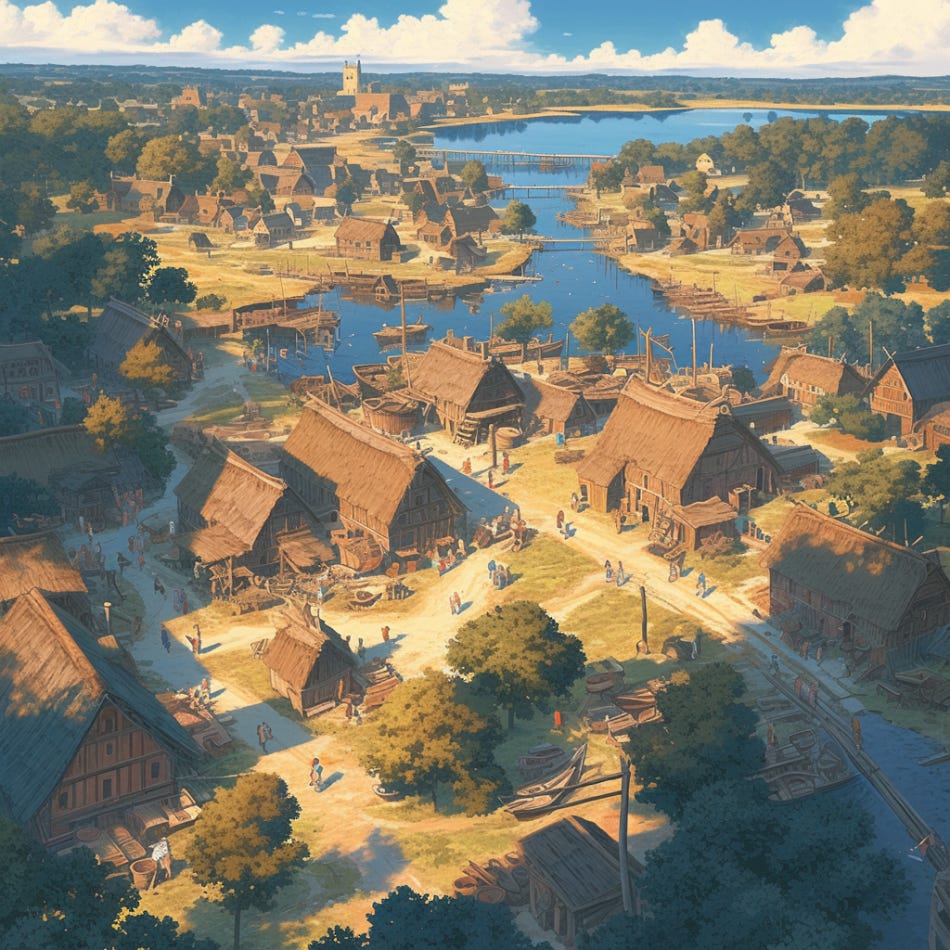






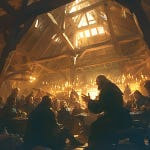
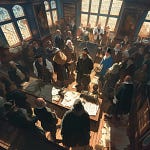
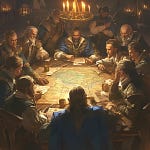
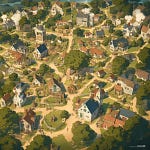
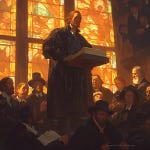
Share this post